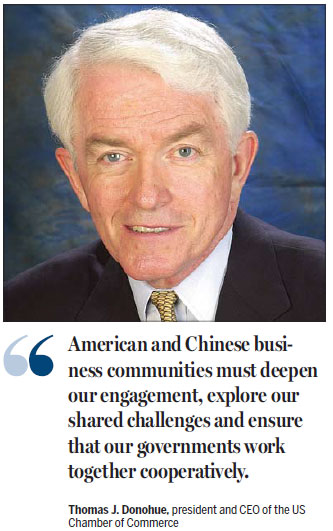US-China understanding benefits the world
A successful bilateral investment treaty would build on existing relationship
The United States and China share a highly interdependent yet complex relationship that is critically important to both countries and the world. Our nations benefit from areas of fruitful cooperation, even beyond commerce. But it's no secret that there are disagreements, disputes and tensions.
During his state visit to Washington, President Xi Jinping and US President Barack Obama have the chance to work through the differences and renew the vision for a positive and cooperative relationship.
The US-China commercial relationship is among the world's largest. China is a nearly $600 billion market for American companies, and the country has become the United States' third-largest export market.
While the US has long been a significant investor in China, Chinese annual foreign direct investment in the US has grown exponentially and now exceeds FDI by US companies into China. More than 80,000 Americans across the US are employed directly by Chinese firms, and that number is expected to grow fourfold within five years.
Despite these opportunities, a growing number of issues are threatening to drive us apart. Our fear is that we could face an economic relationship in the future characterized increasingly more by separate economic development, innovation and financial flows rather than joint opportunity and collaboration.
We must not allow that to happen. American and Chinese business communities must deepen our engagement, explore our shared challenges and ensure that our governments work together cooperatively to preserve stability and growth in the global economy.
Our two countries should embrace mutually beneficial opportunities. The one with the greatest potential is a bilateral investment treaty.
A BIT would build on the burgeoning ties between the US and China and is the logical next step in our relationship. Advances in our commercial relations over the past several years have been nothing short of astounding - supporting strong domestic growth in both economies and contributing to jobs, innovation and productivity gains. But as China's growth slows and uncertainty seizes the global economy, increasing US-China economic integration is more important than ever.
Historic opportunity
A high-standard, comprehensive US-China BIT is a historic opportunity to strengthen our commercial ties, boost both economies and increase global stability. And our leaders should seize it.
Expanding and sustaining that investment openness through a BIT would strengthen economic growth in both countries. A BIT would benefit American companies and their workers by providing better access to the Chinese market, resulting in more sales and job creation. Treaty-based, enforceable rights with independent dispute settlement would provide American companies with new opportunities to expand in the world's second-largest market, protect their intellectual property and ensure their ability to compete on a level playing field.
China also has much to gain from a BIT. Increased US investment in China would create Chinese jobs, lead to higher-value products and lower prices for consumers, expand China's tax base, and introduce valuable managerial and technical expertise into the country. In addition, a BIT would boost the confidence of Chinese entities considering the risks and benefits of investing in the world's largest and most competitive market.
Securing a high-standard, comprehensive BIT will not be easy, however. BITs are ambitious agreements that result in significant changes in the way foreign investment is regulated. The BIT should ensure that governments do not favor their state-owned enterprises that compete commercially and ensure they operate in accordance with commercial considerations; limit the discretion of regulators to unfairly discriminate in their enforcement of law; mandate increased transparency, fairness and due process in administrative and judicial enforcement; and provide a bulwark against policies that attempt to coerce or induce the transfer of technology and localization of data.
Urgent improvements
The good news is that the Chinese government has already created opportunities for meaningful improvements to a number of these concerns in the short-term, without the mandate of a BIT. Such improvements are urgently needed to benefit the Chinese economy, advance innovation and increase consumer welfare.
China needs to adopt key reforms with or without a BIT, a fact Chinese leaders acknowledged in their plan for accelerating reform presented at the third plenary session of the Communist Party's 18th Central Committee in 2013. A significantly improved negative list offer would provide a measurable signal of President Xi's intent to increase the role of the market in the economy and to pursue inclusive reforms that allow foreign companies to play a greater role in helping China achieve its goals as a prosperous and innovative economy. Near-term market opening in advance of a BIT would also go a long way to creating the momentum and public support needed in the US to secure a high standard BIT once negotiations are completed.
The development of US-China relations is a defining strategic issue for both countries. Concluding negotiations on a high-standard BIT is the best opportunity facing both presidents to renew the vision for the partnership and take concrete steps to improve it. Importantly, it would also ensure that cooperation, rather than differences, dominate in this complex relationship.
This is the purpose of the US Chamber's joint efforts with the China Center for International Economic Exchanges to strengthen business-to-business engagement through regular dialogue among CEOs on both sides. When CCIEE chairman and former vice-premier Zeng Peiyan and I convene the seventh meeting of the US-China CEO Dialogue in Beijing days prior to President Xi's departure for the US, we will call on the two governments to strategically address broader bilateral relations.
Leaders, politicians and citizens of both countries must demonstrate clarity, common sense and maturity in conducting and viewing our bilateral relations. We can forge a deeper commercial engagement that benefits the workers and businesses of both countries, and this must happen even as we work through our challenges.
Thomas J. Donohue is president and CEO of the US Chamber of Commerce, the world's largest business federation representing the interests of more than 3 million businesses.

(China Daily 09/25/2015 page22)














